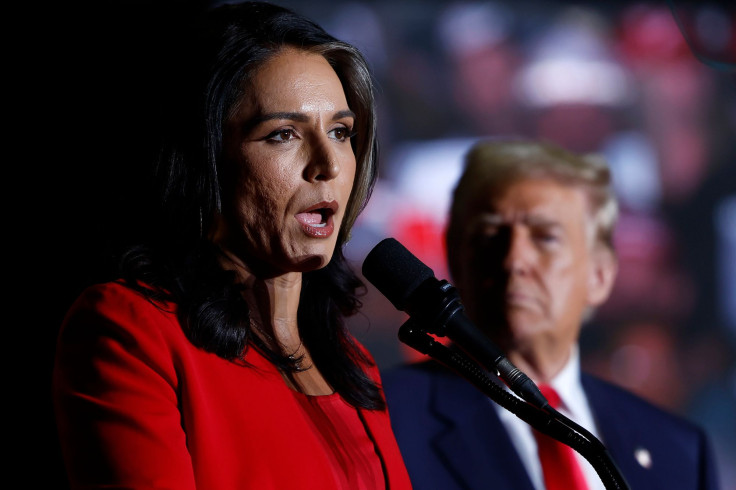
Tulsi Gabbard's nomination to be the next director of national intelligence is seemingly on shaky ground as some Republican senators continue to be skeptical about supporting her.
Semafor reported on Wednesday that potential holdouts are hesitant about past statements about Russian President Vladimir Putin, which they saw as too warm, as well as a trip to Syria in 2017, in which Gabbard met with Bashar al-Assad.
The outlet quoted a GOP senator saying that there are "very serious concerns by enough members to put her nomination in jeopardy." And while Trump's team has not been told that she definitely has not enough support, her standing has not cleared initial skepticism like it happened with Pete Hegseth, who does appear to have the necessary votes to be the next Defense Secretary.
A confirmation hearing for Gabbard has not been scheduled yet as the Senate continues to wait on her FBI background check.
President Donald Trump and his team are still seemingly behind Gabbard and her nomination. Alexa Henning, a spokesperson for the former Democratic Rep., said there is no public opposition to her and that Intelligence panel members from both praties have "shown positive support for her nomination and qualifications."
"She's met with almost every GOP Senator in the U.S. Senate and Democrats who've accepted her invitation to meet. She is continuing the advice and consent process in the Senate and looks forward to her hearing," Henning told the outlet.
Even if there has not been public opposition from GOP senators, others have come out to speak against her nomination. Nearly 100 former U.S. officials signed an open letter in early December to that effect, including former Deputy Secretary of State Wendy Sherman, former NATO Deputy Secretary General Rose Gottemoeller, former National Security Adviser Anthony Lake, along with a slew of additional former intelligence and national security officials.
"Her sympathy for dictators like Vladimir Putin and Assad raises questions about her judgment and fitness," the letter stated.
The letter was addressed to then-Majority Leader-elect John Thune and Majority Leader Chuck Schumer and it implored them to hold closed-door briefings when the Senate meets to approve Gabbard's nomination.
Former national security adviser John Bolton also said in December that Gabbard has shown "an inclination to believe the most outrageous propaganda against the United States by some of its strongest enemies."
Speaking to POLITICO, Bolton, who has repeatedly criticized Gabbard since her nomination, cited as an example the unfounded theory about the U.S. conducting biological warfare research in Ukraine.
Bolton went on to say that the tendency "raises serious questions about her judgement." He described it as a "funhouse of mirrors" view of American foreign policy that "goes beyond normal political discourse in this country."
During the 2016 presidential campaign, Gabbard, then a Democratic candidate, sparred with former Secretary of State Hillary Clinton, who said Russia was backing the Hawaii native and that she was a Kremlin favorite who was supported by its propaganda apparatus. Gabbard responded by calling Clinton the "queen of warmongers."
After Russia's February 2022 invasion of Ukraine, Gabbard posted a video on social media repeating a false claim pushed by the Kremlin that the U.S. was funding biological weapons labs in Ukraine. The claim prompted Senator Mitt Romney, R-Utah, to say Gabbard was "parroting false Russian propaganda."
As director of national intelligence, Gabbard will oversee agencies like the CIA, FBI and the National Security Agency (NSA). She will require Senate confirmation to take the role. If she is confirmed to the role, she would manage a budget of more than $70 billion and oversee 18 intelligence agencies.
© 2025 Latin Times. All rights reserved. Do not reproduce without permission.





